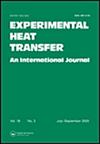蛇形管换热器/反应器中紊流驱动的液固传质:应用与启示
IF 2.9
3区 工程技术
Q2 ENGINEERING, MECHANICAL
引用次数: 0
摘要
摘要本文利用铜溶解技术研究了紊流条件下蛇形管换热器/反应器的液固质量和传热速率。关键因素包括溶液流速、性能、管径、u型弯曲率和减阻聚合物。经验相关预测的传质系数比直管高4.12-5.36倍。蛇形管显示了经济可行的扩散控制反应的潜力。减阻聚合物(Polyox WSR-301)可将腐蚀速率降低23.3%。该研究强调了蛇形管在催化连续反应器和膜工艺中的适用性,强调了蛇形管在换热器设计和腐蚀余量预测中的意义。关键词:间歇循环反应器减阻聚合物热交换器/反应器膜分离二次流蛇形管披露声明作者未报告潜在利益冲突。数据可得性声明支持本研究结果的数据可根据通讯作者的合理要求获得。本文章由计算机程序翻译,如有差异,请以英文原文为准。
Turbulent flow-driven liquid-solid mass transfer in serpentine tube heat exchanger/reactors: applications and implications
ABSTRACTThis study examines liquid-solid mass and heat transfer rates in serpentine tube heat exchangers/reactors under turbulent flow using the copper dissolution technique. Key factors include solution flow rate, properties, tube diameter, U-bend curvature, and drag-reducing polymers. An empirical correlation predicts mass transfer coefficients, which are 4.12–5.36 times higher than straight tubes. Serpentine tubes show potential for economically viable diffusion-controlled reactions. Drag-reducing polymer (Polyox WSR-301) reduces corrosion rates by up to 23.3%. The study highlights serpentine tubes’ applicability in catalytic continuous reactors and membrane processes, emphasizing their significance in heat exchanger design and corrosion allowance prediction.KEYWORDS: Batch recycle reactordrag-reducing polymerheat exchanger/reactormembrane separationsecondary flowserpentine tubes Disclosure statementNo potential conflict of interest was reported by the author(s).Data availability statementThe data that support the findings of this study are available from the corresponding author upon reasonable request.
求助全文
通过发布文献求助,成功后即可免费获取论文全文。
去求助
来源期刊

Experimental Heat Transfer
工程技术-工程:机械
CiteScore
6.30
自引率
37.10%
发文量
61
审稿时长
>12 weeks
期刊介绍:
Experimental Heat Transfer provides a forum for experimentally based high quality research articles and communications in the general area of heat-mass transfer and the related energy fields.
In addition to the established multifaceted areas of heat transfer and the associated thermal energy conversion, transport, and storage, the journal also communicates contributions from new and emerging areas of research such as micro- and nanoscale science and technology, life sciences and biomedical engineering, manufacturing processes, materials science, and engineering. Heat transfer plays an important role in all of these areas, particularly in the form of innovative experiments and systems for direct measurements and analysis, as well as to verify or complement theoretical models.
All submitted manuscripts are subject to initial appraisal by the Editor, and, if found suitable for further consideration, to peer review by independent, anonymous expert referees. All peer reviews are single blind and submission is online via ScholarOne Manuscripts. Original, normal size articles, as well as technical notes are considered. Review articles require previous communication and approval by the Editor before submission for further consideration.
 求助内容:
求助内容: 应助结果提醒方式:
应助结果提醒方式:


